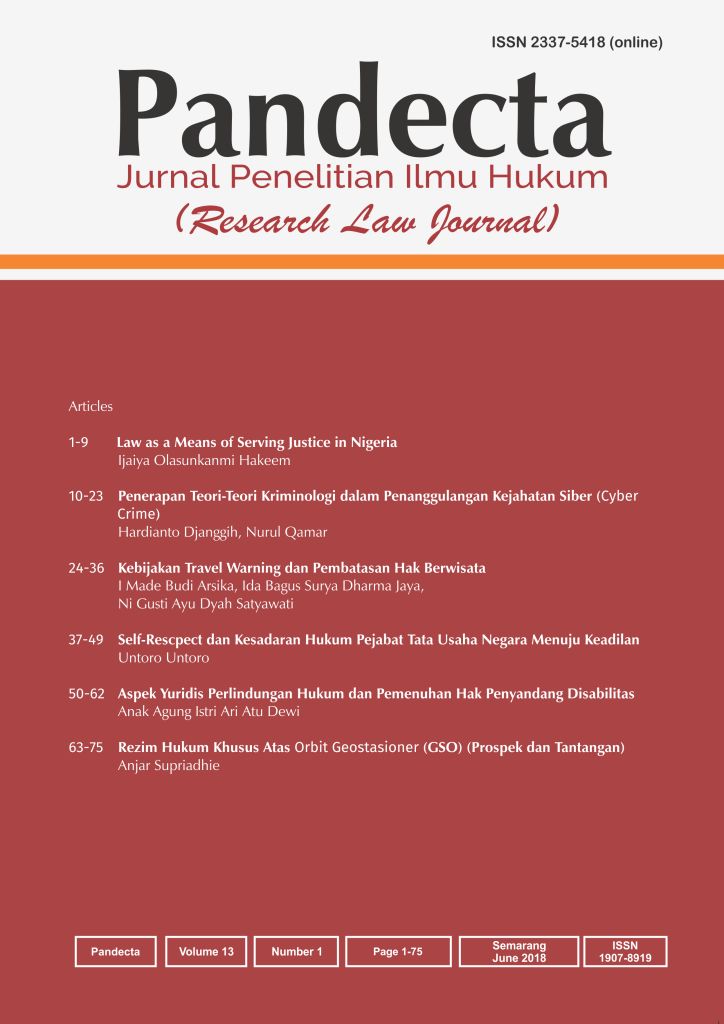Law as a Means of Serving Justice in Nigeria
(1) University of Ilorin
Abstract
Right from the ancient times, the relationship between law and justice constantly appears to be one of the most stimulating as well as penetrating controversial ideas. The paper will discuss the fundamental concept of law and justice by assessing the ideas of a few justice thinkers, some key theories of law and justice, and some cardinal indicators of law and justice with a practical example from Nigeria. The study adopted qualitative research which comprises doctrinal and non-doctrinal methods. The research draws information from primary and secondary sources. The information obtained was subjected to content analysis. The paper found that justice is an inherent component of the law and not separate or distinct from it. The paper also found that the idea of justice has been trapped by political ideologies, religions, cultural intolerance, poverty, deprivation, gender discrimination, violation of human rights and inequality in Nigeria. In quintessence, the paper concludes that law is justice. The paper recommends that the courts should lean on the side of justice in any case of conflict between law and justice for effective administration of justice.
Keywords
Full Text:
PDFReferences
Anthony D, 91977-78) The Limits of Legal Realism, 87 YALE L.J. 468.
Anthony, D. "On the Connection between Law and Justice" (2011). Faculty Working Papers.https://scholarlycommons.law.northwestern.edu/facultyworkingpapers/2. Accessed on 15th December, 2017
Aquinas, T. (1988) Law, Morality and Politics. William, P., Baum
Aristotelis O, (1831) (ed.) Academia Regla Borusica, Berlin, vol. II, p. 1108,
Austin, J (1832) The Province of Jurisprudence Determined, W. Rumble (ed.), Cambridge: Cambridge University Press, 1995
Bhandari, S. (2014) The Ancient and Modern Thinking about Justice: An Appraisal of the Positive Paradigm and the Influence of International Law. Ritsumeikan Annual Review of International Studies, vol. 13 pp. 1-41
Bierce A, (2015) The Devil's Dictionary, Axim Publishing, p 116
Bodenheimer (1974) Jurisprudence. Harvard University Press p. 163.
Craeis On Statute Law, 7th Edition.
Dicey, A. V., (1958) Introduction to the Study of the Law of the Constitution, (10th ed.)
Garner B. A, (1999) Black’s Law Dictionary, (7thed.) West Group, St. Pauls. Minn
Hart, H.L.A (1961) Concept of Law. Oxford: University Press, p.207
John Rawls, (1971) A Theory of Justice (called “Theoryâ€). Cambridge, MA: Harvard University Press.
Jonathan, B (1995). "Life and Work". The Cambridge Companion to Aristotle. Cambridge University Press. p. 16
Jowiff , E. The Dictionary of English Law 1959 at p. 1819
Kelsen, H. (1945) General Theory of Law and State 14.
Kent, I (1965) The Metaphysical Aspect of Justice. Transl. J Ladd, Indiariapolis.
Lissitzyn, O.J. (1936). The Meaning of the Term Denial of Justice in International Law. The American Journal of International Law. Vol. 30, No. 4 (Oct., 1936), American Society of International Law; Cambridge University Press. pp. 632-646.
Okeke, B.O.O (2002-2010) The Relationship of Law and Morality: Dichotomy or Complementary. Nigeria Juridical Review Vol. 9 p.1.
Pound R, (1914) 'Justice According to Law', The Mid-West Quarterly, 1:3 pp. 223-235.
Rawls J, (1958) 'Justice as Fairness' The Philosophical Review, pp. 164-194 at 164.
Rawls, J. (1971) A Theory of Justice. Havard University Press, p.8.
Yakubu, J.A. (ed.) (1998) Administration of Justice in Nigeria. Essays in Honour of Hon. Justice Mohammed Lawal Uwais, Malhouse Press Ltd. Ikeja, Lagos, Nigeria.
Refbacks
- There are currently no refbacks.


